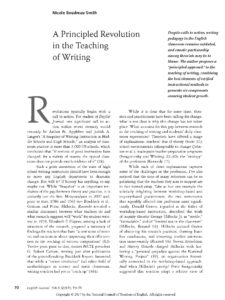Author: Nicole Boudreau Smith
Summary: Despite calls to action, writing pedagogy in the English classroom remains outdated, and caustic partisanship among theorists may be to blame. The author proposes a “principled approach” to the teaching of writing, combining the best elements of verified instructional methods to generate six components ensuring student growth.
Original Date of Publication: 2017
Excerpt
It is for this reason, then, that I agree with Smagorinsky that “principled practice,” as opposed to “best practice,” is a viable mechanism by which our profession may actually achieve the revolution we have aspired to. By principled practice, Smagorinsky refers to teachers taking into account the various forces, needs, and resources operating in the classroom; planning instruction from a platform of informed teacher knowledge; and engaging consistently in reflective practice with others. And since principled practice requires faithful adherence to the findings of educational research, it “invests a great deal of authority and responsibility in the teacher” while precluding an “anything goes” approach (Smagorinsky 20).
Related Resources
- Beyond Strategies: Teacher Practice, Writing Process, and the Influence of Inquiry
- What Data-Driven Instruction Should Really Look Like
Original Source: National Council of Teachers of English, https://library.ncte.org/journals/EJ/issues/v106-5/29098
